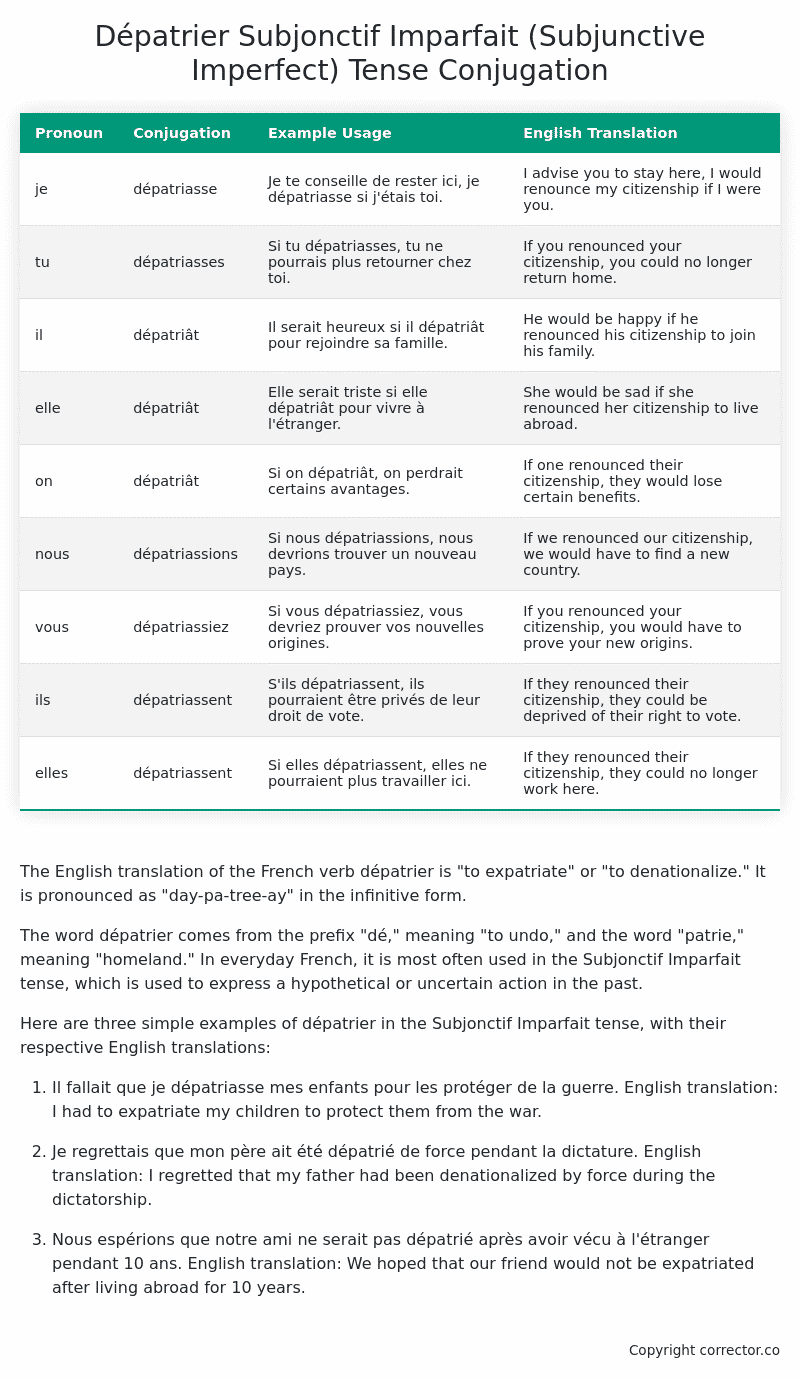Subjonctif Imparfait (Subjunctive Imperfect) Tense Conjugation of the French Verb dépatrier
Introduction to the verb dépatrier
The English translation of the French verb dépatrier is “to expatriate” or “to denationalize.” It is pronounced as “day-pa-tree-ay” in the infinitive form.
The word dépatrier comes from the prefix “dé,” meaning “to undo,” and the word “patrie,” meaning “homeland.” In everyday French, it is most often used in the Subjonctif Imparfait tense, which is used to express a hypothetical or uncertain action in the past.
Here are three simple examples of dépatrier in the Subjonctif Imparfait tense, with their respective English translations:
-
Il fallait que je dépatriasse mes enfants pour les protéger de la guerre.
English translation: I had to expatriate my children to protect them from the war. -
Je regrettais que mon père ait été dépatrié de force pendant la dictature.
English translation: I regretted that my father had been denationalized by force during the dictatorship. -
Nous espérions que notre ami ne serait pas dépatrié après avoir vécu à l’étranger pendant 10 ans.
English translation: We hoped that our friend would not be expatriated after living abroad for 10 years.
Table of the Subjonctif Imparfait (Subjunctive Imperfect) Tense Conjugation of dépatrier
| Pronoun | Conjugation | Example Usage | English Translation |
|---|---|---|---|
| je | dépatriasse | Je te conseille de rester ici, je dépatriasse si j’étais toi. | I advise you to stay here, I would renounce my citizenship if I were you. |
| tu | dépatriasses | Si tu dépatriasses, tu ne pourrais plus retourner chez toi. | If you renounced your citizenship, you could no longer return home. |
| il | dépatriât | Il serait heureux si il dépatriât pour rejoindre sa famille. | He would be happy if he renounced his citizenship to join his family. |
| elle | dépatriât | Elle serait triste si elle dépatriât pour vivre à l’étranger. | She would be sad if she renounced her citizenship to live abroad. |
| on | dépatriât | Si on dépatriât, on perdrait certains avantages. | If one renounced their citizenship, they would lose certain benefits. |
| nous | dépatriassions | Si nous dépatriassions, nous devrions trouver un nouveau pays. | If we renounced our citizenship, we would have to find a new country. |
| vous | dépatriassiez | Si vous dépatriassiez, vous devriez prouver vos nouvelles origines. | If you renounced your citizenship, you would have to prove your new origins. |
| ils | dépatriassent | S’ils dépatriassent, ils pourraient être privés de leur droit de vote. | If they renounced their citizenship, they could be deprived of their right to vote. |
| elles | dépatriassent | Si elles dépatriassent, elles ne pourraient plus travailler ici. | If they renounced their citizenship, they could no longer work here. |
Other Conjugations for Dépatrier.
Le Present (Present Tense) Conjugation of the French Verb dépatrier
Imparfait (Imperfect) Tense Conjugation of the French Verb dépatrier
Passé Simple (Simple Past) Tense Conjugation of the French Verb dépatrier
Passé Composé (Present Perfect) Tense Conjugation of the French Verb dépatrier
Futur Simple (Simple Future) Tense Conjugation of the French Verb dépatrier
Futur Proche (Near Future) Tense Conjugation of the French Verb dépatrier
Plus-que-parfait (Pluperfect) Tense Conjugation of the French Verb dépatrier
Passé Antérieur (Past Anterior) Tense Conjugation of the French Verb dépatrier
Futur Antérieur (Future Anterior) Tense Conjugation of the French Verb dépatrier
Subjonctif Présent (Subjunctive Present) Tense Conjugation of the French Verb dépatrier
Subjonctif Passé (Subjunctive Past) Tense Conjugation of the French Verb dépatrier
Subjonctif Imparfait (Subjunctive Imperfect) Tense Conjugation of the French Verb dépatrier (this article)
Subjonctif Plus-que-parfait (Subjunctive Pluperfect) Tense Conjugation of the French Verb dépatrier
Conditionnel Présent (Conditional Present) Tense Conjugation of the French Verb dépatrier
Conditionnel Passé (Conditional Past) Tense Conjugation of the French Verb dépatrier
L’impératif Présent (Imperative Present) Tense Conjugation of the French Verb dépatrier
L’infinitif Présent (Infinitive Present) Tense Conjugation of the French Verb dépatrier
Struggling with French verbs or the language in general? Why not use our free French Grammar Checker – no registration required!
Get a FREE Download Study Sheet of this Conjugation 🔥
Simply right click the image below, click “save image” and get your free reference for the dépatrier Subjonctif Imparfait tense conjugation!

Dépatrier – About the French Subjonctif Imparfait (Subjunctive Imperfect) Tense
Formation
Common Everyday Usage Patterns
Interactions with Other Tenses
Subjonctif Présent
Indicatif Passé Composé
Conditional
Conditional Perfect
Summary
I hope you enjoyed this article on the verb dépatrier. Still in a learning mood? Check out another TOTALLY random French verb conjugation!


